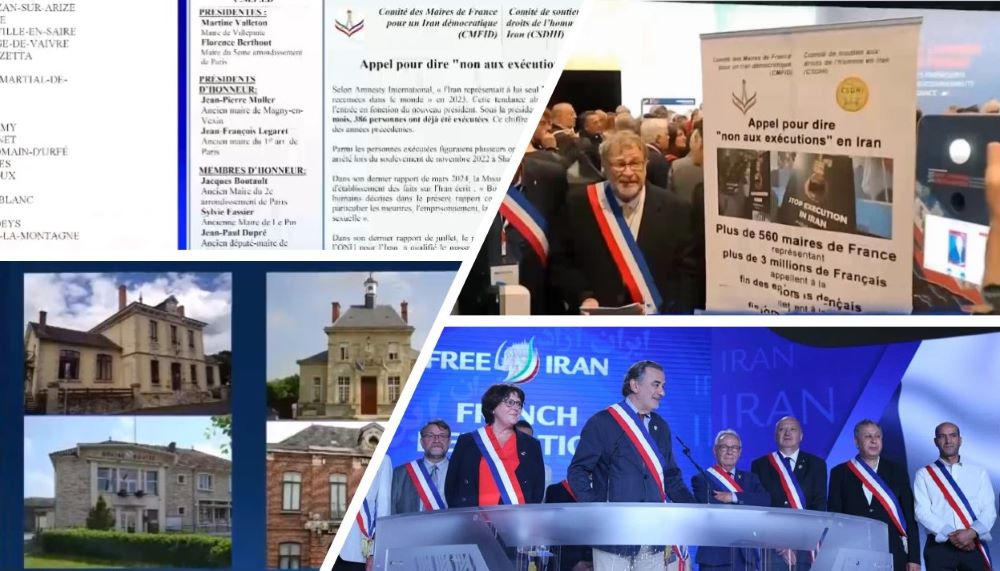
Over 580 French mayors have issued a strong condemnation of Iran’s execution practices and expressed their support for Maryam Rajavi‘s advocacy for the abolition of the death penalty. This declaration was made during the 106th Congress of Mayors held in Paris, where notable mayors such as Michaël Delafosse (Montpellier), Martine Aubry (Lille), and Jean-Michel Baylet (Valence d’Agen) participated. The initiative, organized by the Committee of French Mayors for a Democratic Iran (CMFID) in partnership with the Committee to Support Human Rights in Iran (CSDHI), draws attention to the alarming rise in executions under the current Iranian government.
According to Amnesty International, Iran was responsible for an astonishing 74% of all executions recorded globally in 2023. The situation has deteriorated under President Masoud Pezeshkian, with 386 executions occurring within the first three months of his administration—far surpassing annual totals from previous years. Among those executed was Reza Rasaei, a political dissident arrested during the November 2022 protests in Shahriar, Tehran Province.
The mayors highlighted that Iran holds the dubious distinction of having the highest rates of political executions and per capita killings worldwide. They emphasized that these executions, often justified by the regime in religious terms, serve primarily to instill fear and suppress dissent. The mayors denounced these actions as politically motivated and called for increased international efforts to combat this systematic oppression.
In their statement, they expressed unwavering support for Maryam Rajavi’s campaign to end executions in Iran, commending her Ten-Point Plan aimed at establishing a democratic future that includes the elimination of capital punishment. They affirmed their endorsement of Rajavi’s commitment to abolishing the death penalty as outlined in her vision for Iran’s future. This plan was reiterated by Rajavi during an international jurists’ conference in Paris on August 24, 2024, where she stressed the urgency of combating executions.
📢 #Breaking Over 580 French mayors sign a declaration supporting @iran_policy‘s president-elect, Mrs. @Maryam_Rajavi ’s call to end executions in Iran, citing UN reports of the regime’s crimes against humanity.
The statement condemns the regime’s political use of executions to… pic.twitter.com/lrKptJRzoV— SIMAY AZADI TV (@en_simayazadi) November 26, 2024
The mayors underscored the political nature of Iran’s execution practices, asserting that each execution is fundamentally a political act designed to intimidate and quash potential uprisings. They urged the international community to take decisive action against these abuses, noting that global inaction has allowed the regime to continue its oppressive tactics, with executions serving as a cornerstone of its rule.
The UN Fact-Finding Mission on Iran reported in March 2024 that the regime’s actions—including killings, torture, and sexual violence—constitute crimes against humanity. Furthermore, Professor Javaid Rehman, UN Special Rapporteur on Iran, described the 1988 massacre of 30,000 political prisoners as genocide, highlighting the regime’s long history of human rights violations.
Within Iran, a growing number of political prisoners across 20 prisons have joined the “No to Executions” campaign, conducting hunger strikes every Tuesday since early 2024. This movement has gained significant international traction, with civil society organizations and political leaders rallying to amplify its message.
🇮🇷 Peine de mort : 580 maires de France signent un appel pour dire « non aux exécutions » en #Iran https://t.co/eAQqh8QYsy
— Philippe Rioux (@technomedia) November 23, 2024
The mayors expressed concern over the situation in Iran, referencing widespread protests following Mahsa Amini‘s death in September 2022. This movement, largely led by women, continues to inspire resistance against the regime’s oppressive measures and its increasing reliance on capital punishment.
The collective statement from these French mayors reflects a rising global consensus: urgent action is needed from the international community to hold Iran accountable for its human rights violations and to support the Iranian people’s struggle for justice and democracy.